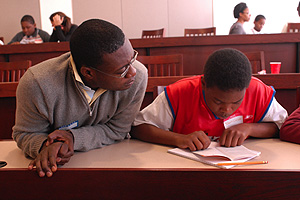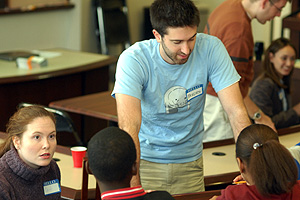Law students become good neighbors by opening up world of law to youths
Sabrina L. MillerNews Office
 Law School student Eric Gyasi assists a young boy from the Betsy Ross Elementary School with learning some common legal terms. | |
University Law School students could easily spend all of their free time squirreled away studying and preparing for whatever high-powered job awaits them upon graduation. But some law students keen on community service are sacrificing some of their Saturdays to supplement the educational needs of local schoolchildren through a student organization called Neighbors and its flagship initiative called the Judges Project.
The Judges Project pairs law students with fifth- through eighth-grade students from Betsy Ross Elementary School near the Law School. The yearlong program kicked off recently on a Saturday morning in Classroom V, where about 30 public school students were put to work copying legal terms from the blackboard. They were given four words to write down and consider: right, litigation, due process clause and jury.
While the words seem simple enough, the idea is to get the students thinking critically, perhaps for the first time in their lives, about the law and how it affects them. Beyond the legal definitions that students will be required to learn each week, the Judges Project is designed to expose students to a world outside of their school and neighborhood, and to inspire them to go to college, said Colin Bumby, a third-year law student.
“It’s important for us to work with students and become part of this community where we go to school,” Bumby said. “We want them thinking seriously about their education, thinking seriously about college and thinking about the law. Who knows? Any one of these students could potentially end up enrolling here one day.”
Nearly 60 law students signed up to work with Neighbors, which also will expand to include a component for high school students, Bumby said. At least 30 law students are actively involved with the Judges Project. Each week, the Betsy Ross students will be introduced to guest speakers and learn different aspects of the law. They also will take field trips, all culminating in a mock trial to be held in May 2007.
The project itself has had fits and starts over the last decade, from being very active in the mid-1990s and then dormant in the early 2000s. “This group is serious about remaining active with the community and making the program work,” Bumby said.
The program is running on what coordinator Brad Romney calls a “bare bones budget” and needs support for transportation, food and school supplies and funding for special events and field trips. “We could really use the support of alumni, law firms and any other group that can help us out and help provide us with what we need for the students,” Romney said.
As students were split into groups to take tours around the building, third-year student Christina Gibson, who is African American, stopped her group at a portrait of Earl B. Dickerson, the pioneering attorney and entrepreneur who became the Law School’s first black graduate in 1920.
 Brad Robertson (center, standing) works with a young student from Betsy Ross Elementary School during a Saturday session of the Judges Project. | |
Gibson, a former high school teacher from the Atlanta, Ga., area, told the students, “Most law schools didn’t accept black students back then, but he was able to come to Chicago, which was fairly progressive for its time.”
She told the students, who were all African American, about Dickerson’s role as general counsel at black-owned Supreme Life Insurance in the nearby Bronzeville neighborhood, and about his role in the landmark Hansberry v. Lee housing segregation case in Woodlawn that inspired the play A Raisin in the Sun—a play familiar to the students. “He was a great, great man, and it’s important for you all to know that history,” Gibson said.
Upon returning to the classroom after their tours, students were given copies of the Constitution and, with law students guiding them, made presentations on different amendments from the Bill of Rights.
A seventh-grade boy, asked to explain the Fourth Amendment, gave an example of the police searching the vehicle of two men who he said were smoking marijuana on his block. He explained that although the Fourth Amendment protects people from “unreasonable search and seizure,” he understood clearly that the police were searching the vehicle because the men inside had been seen engaging in an illegal activity. Betsy Ross Dean of Students Darrell Kelly, who accompanies the students to the Saturday sessions, shook his head in amazement at the boy’s story.
“Now if that’s not a real-life, practical application and understanding of the law, I don’t know what is. This is why it’s so important for our young people to be involved in programs like this,” Kelly said. “They need to have the opportunity to express themselves and express their understanding of things in an intellectual, academic capacity. I’m not sure they’re always encouraged to do that in the classroom.”
Kelly said the majority of students who attend Betsy Ross Elementary School are statistically low income, and that the school had previously been on academic probation but has made great improvement over the past year. The Judges Project is an important outlet for students, he said.
“The University of Chicago is maybe a mile away from their school, but many of them have never been here before and some of them haven’t even heard of it. They need to know that this campus holds a vast amount of opportunity for them,” Kelly said.
Conversely, because the law students have been blessed with so much, they have a special duty to give back to the next generation, Gibson said. “We go to school here, we live here, we have a responsibility to touch the community and, to the extent that we can, leave it a better place,” she said.
![[Chronicle]](/images/sidebar_header_oct06.gif)